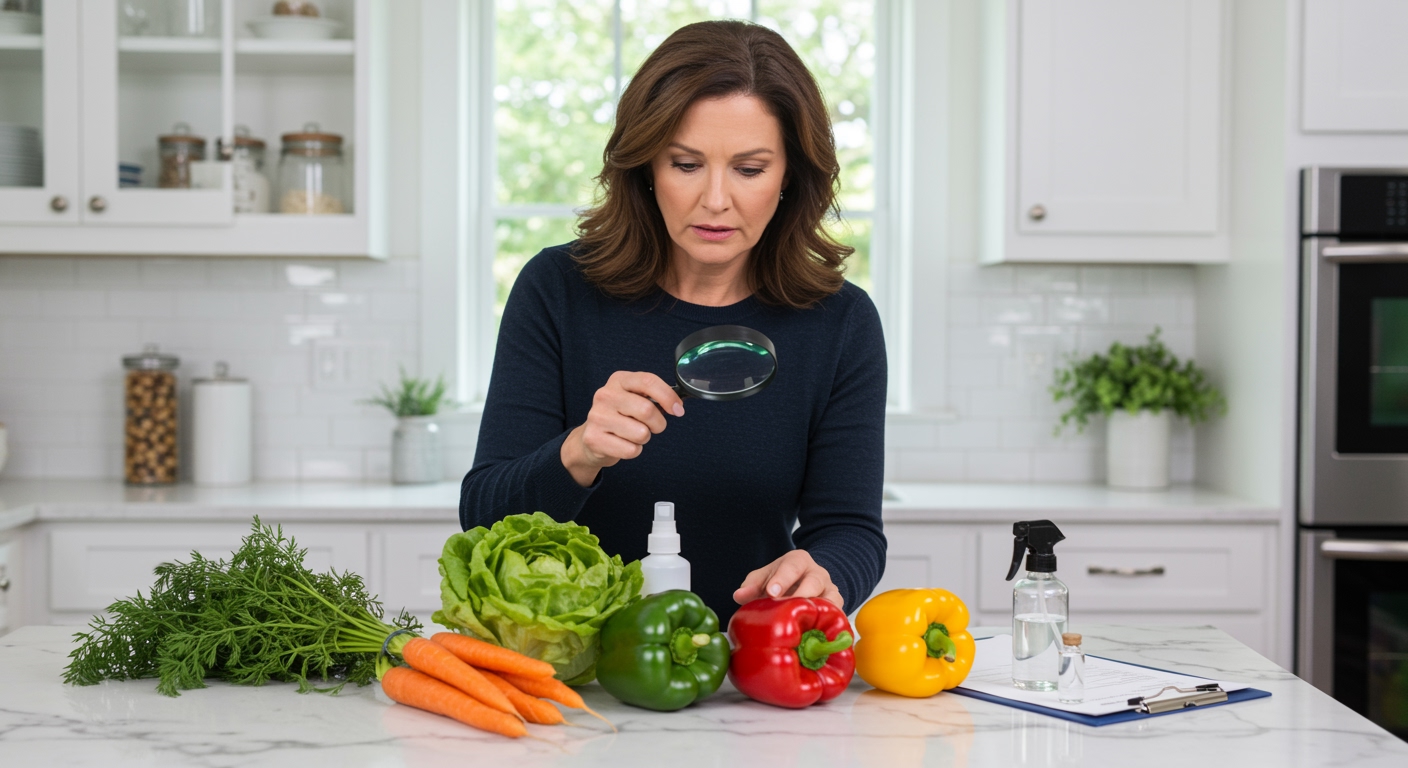✪ Key Takeaway: Organic vegetables can contain pesticides from approved chemicals and cross-contamination from nearby conventional farms.
Introduction
You walk into the grocery store and head straight to the organic section because you want the cleanest vegetables possible.
You pay extra money believing these vegetables are completely free from harmful chemicals and pesticides.
Hi, I’m Abdur, your nutrition coach and today I’m going to reveal the uncomfortable truth about pesticides in organic vegetables that most people never discover.
What Pesticides Are Actually Allowed In Organic Farming?
Organic farming does not mean pesticide-free farming.
The USDA maintains a National List of approved substances that organic farmers can legally use on their crops.
This list includes over 40 different synthetic pesticides that are considered acceptable for organic production.
Copper sulfate, for example, is a commonly used organic pesticide that can be toxic to humans in high concentrations.
Rotenone was another approved organic pesticide until 2018, when it was banned due to links with Parkinson’s disease.
The key difference is that organic pesticides must be derived from natural sources or be synthetic substances that meet specific criteria for environmental safety.
✪ Fact: Natural pesticides can sometimes be more toxic than synthetic ones, requiring higher application rates to be effective.
How Does Cross-Contamination Happen Between Farms?
Wind drift carries pesticides from conventional farms to neighboring organic operations.
Studies show that pesticide residues can travel several miles through air currents, especially during spray applications.
Shared water sources like irrigation systems and groundwater can also transport chemical residues between farms.
Equipment contamination occurs when the same harvesting machines, storage facilities, or transportation trucks are used for both conventional and organic crops.
Even soil contamination from previous conventional farming practices can persist for years after transitioning to organic methods.
The three-year transition period required for organic certification does not guarantee complete elimination of all chemical residues from the soil.
✪ Note: Organic farmers can lose their certification if pesticide contamination exceeds 5% of the EPA tolerance level.
Why Do Testing Results Show Pesticides In Organic Produce?
Consumer Reports testing found pesticide residues in 43% of organic produce samples.
The levels were generally lower than conventional produce, but the presence of any residues surprised many consumers.
Some organic vegetables contained multiple pesticide residues, indicating exposure from various sources.
Imported organic produce often shows higher pesticide residue rates due to different international standards and enforcement practices.
The detection limits of modern testing equipment can identify incredibly small amounts of chemicals that would have been undetectable decades ago.
Processing facilities that handle both conventional and organic products can introduce cross-contamination during washing, packaging, or storage.
✪ Pro Tip: Choose locally grown organic vegetables to reduce the risk of contamination during long-distance transportation.
What Should You Do About Pesticides In Your Vegetables?
Washing your vegetables thoroughly with running water removes most surface pesticide residues.
A simple scrub brush can eliminate additional residues from firm vegetables like potatoes and carrots.
Peeling vegetables removes the outer layer where most pesticide residues concentrate, though you also lose some nutrients.
Focus your organic purchases on the Dirty Dozen vegetables that typically have the highest pesticide residues when grown conventionally.
Support local farmers who use sustainable practices and can tell you exactly what they apply to their crops.
Remember that eating vegetables, whether organic or conventional, provides more health benefits than avoiding them due to pesticide concerns.
✪ Fact: The health benefits of eating vegetables far outweigh the potential risks from pesticide residues at current exposure levels.
The Bottom Line
Organic vegetables can indeed contain pesticides from approved chemicals and environmental contamination.
Perfect food does not exist in our imperfect world, but informed choices lead to better health outcomes.
Share your thoughts about organic vegetables and pesticides in the comments below, and let me know what questions you have about making the best food choices for your family.
References
At NutritionCrown, we use quality and credible sources to ensure our content is accurate and trustworthy. Below are the sources referenced in creating this article:
- Consumer Reports: Pesticides in Produce
- USDA: National List of Allowed and Prohibited Substances
- Civil Eats: Can Eating Organic Lower Your Exposure to Pesticides
- PMC: Pesticide Residues in Organic Food

